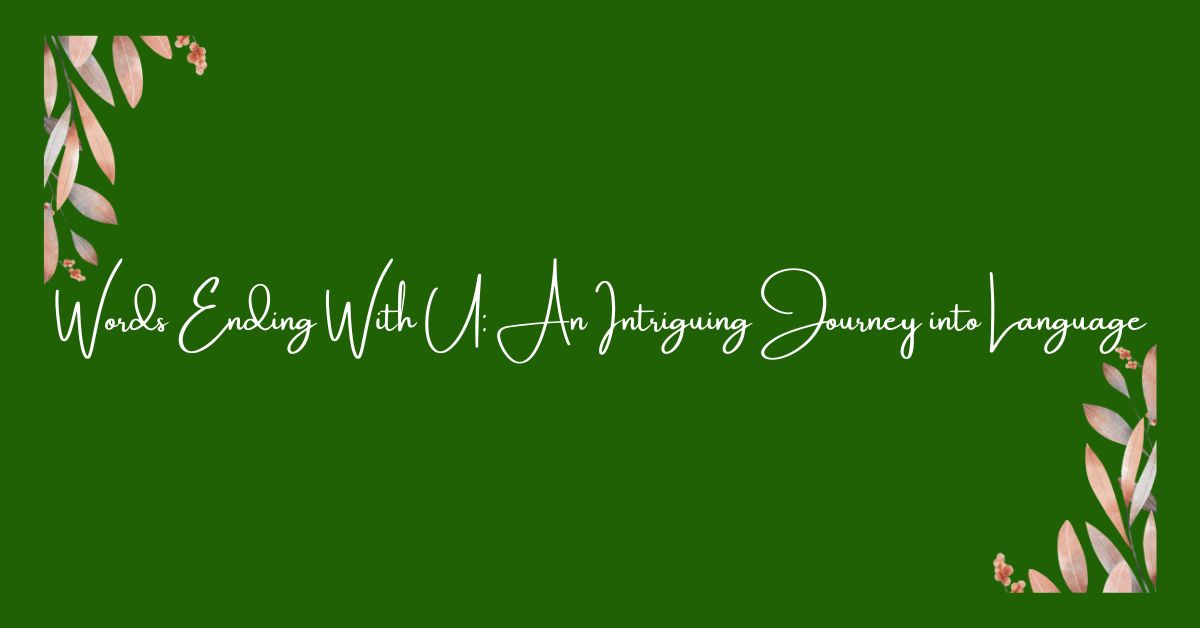Have you ever noticed how rare words ending with U” are in English? They stand out, adding a unique touch to language and making conversations, writing, and word games more exciting. If you’ve never explored them, you’re in for a fascinating discovery.
Words ending with U” are terms that conclude with the letter U,” often borrowed from languages like French, Japanese, and Hawaiian. Though uncommon, they carry rich meanings and cultural significance. Mastering these words can enhance your vocabulary and give you an edge in language-based games.
In this article, you’ll uncover intriguing words ending in U,” their meanings, and how to use them effectively. Whether you love wordplay, want to boost your writing, or just enjoy linguistic oddities, these words will surprise and inspire you. Let’s dive into the world of rare yet captivating vocabulary!
Why Words Ending with U Are Special
Rare words make English more interesting. Words ending with U do not appear often, but they are special. Many of these words come from French, Japanese, and Hawaiian. Some examples include “guru” from Sanskrit, “tofu” from Japanese, and “plateau” from French. These words help people learn about different cultures. They also improve vocabulary and make writing unique.
Different uses make these words useful. Many are helpful in Scrabble, Wordle, and crossword puzzles. They add variety to writing and make sentences more creative. Some of these words describe places, food, and objects. Learning them improves spelling and pronunciation. Teachers, students, and writers benefit from knowing these words. Expanding knowledge of rare words makes English more fun.
Categories of Words Ending with U
Different groups help in understanding words ending with U. Some are short, like “emu” and “gnu,” while others are long, like “plateau” and “bureau.” Many of these words come from French, Japanese, Hawaiian, and African languages. Some describe animals, food, and places, while others are surnames or borrowed terms. Learning these words makes vocabulary stronger and more interesting.
Each category has special words. Three-letter words include “flu” and “liu.” Four-letter words like “guru” and “menu” are common in daily life. Five-letter words such as “haiku” and “adieu” come from different cultures. Longer words like “chateau” and “milieu” make writing more creative. Each group helps in different ways, whether for writing, speaking, or word games. Learning them improves language skills and makes English more fun.
3-letter Words Ending with U
Short words make learning easier. Three-letter words ending with U are simple but useful. Many come from different languages and have interesting meanings. These words help in daily conversation, writing, and word games. Some describe animals, while others are surnames or abbreviations.
Here are some common examples:
- Emu – A large, flightless bird from Australia.
- Gnu – An antelope found in Africa.
- Flu – Short for influenza, a common illness.
- Hsu – A common Chinese surname.
- Liu – Another surname of Chinese origin.
- Zhu – A surname used in Chinese-speaking regions.
- Aku – A type of fish found in tropical waters.
- Kau – A Hawaiian word for “season” or “period.”
- Ulu – A Polynesian term for breadfruit.
- Tau – A Greek letter used in mathematics and science.
- Mau – A term meaning “firm” or “unyielding” in some Pacific languages.
- Pau – A Hawaiian word meaning “finished” or “completed.”
- Tzu – Found in names like “Lao Tzu”, meaning “Master” in Chinese.
- Dzu – A rare word used in some Slavic languages.
These words may be short, but they are powerful. They are great for Scrabble, crossword puzzles, and expanding vocabulary.
You’ll Love: Adjectives Start with J: Words That Start with the Letter J
4-Letter Word That End with U
Short words help in everyday life. Four-letter words ending with U are simple but important. Some describe food, places, or people, while others come from different languages. Learning these words improves vocabulary and helps in writing, speaking, and word games.
Here are some useful examples:
- Guru – A teacher or expert in a field.
- Menu – A list of food options at a restaurant.
- Tofu – A protein-rich food made from soybeans.
- Lieu – A French word meaning “in place of.”
- Pulu – A type of fiber from tree ferns.
- Kapu – A Hawaiian word meaning “forbidden” or “sacred.”
- Hulu – A famous video streaming service.
- Babu – A respectful term for a gentleman in India.
- Sudu – A word meaning “white” in Sinhalese.
- Ratu – A Fijian title for a chief or noble.
- Yaku – A Quechua word for “water.”
- Namu – A Korean word meaning “tree” or “wood.”
- Habu – A type of venomous snake found in Japan.
- Garu – A term used in some Asian languages.
- Waru – A word meaning “bad” in Japanese slang.
These words come from French, Sanskrit, Hawaiian, and English. They make learning fun and expand language skills.
5-Letter Words Ending with U
Longer words add more depth to language. Five-letter words ending with U are rare but useful. Some come from French, Japanese, and African languages. These words help in writing, games, and conversations.
Here are some common examples:
- Adieu – A French word meaning “farewell.”
- Bayou – A slow-moving body of water in the U.S.
- Haiku – A short Japanese poem with a 5-7-5 syllable pattern.
- Venue – A place where events or activities happen.
- Jujus – Objects believed to have magical powers in African traditions.
- Cajou – Another word for cashew, borrowed from French.
- Tabou – A variation of “taboo,” meaning forbidden.
- Hindu – A follower of Hinduism, a major world religion.
- Honlu – A rare word, sometimes used in Hawaiian contexts.
- Snafu – A slang term for a chaotic or messy situation.
- Mariu – A name found in some Polynesian cultures.
- Kanzu – A traditional long robe worn in East Africa.
- Bantu – A group of African languages and ethnic groups.
- Kaidu – A historical name linked to a Mongol ruler.
These words make writing richer and games more exciting. They also show how English borrows from other languages.
6-Letter Words Ending with “U”
Longer words make language more interesting. Six-letter words ending with U are uncommon but useful. Many come from French, Japanese, and African languages. Learning them helps in writing, vocabulary, and word games.
Here are some examples:
- Bureau – A desk with drawers or an office department.
- Milieu – A French word meaning “environment” or “setting.”
- Landau – A type of four-wheeled carriage.
- Chapeau – A French word for “hat.”
- Noyaux – The inner stone or seed of a fruit (plural in French).
- Rideau – A French word meaning “curtain.”
- Tableau – A striking or dramatic scene or representation.
- Bambou – A French word for bamboo.
- Cayaku – A rare word linked to indigenous languages.
- Gombou – A variation of “gombo,” another word for okra.
- Katouu – Found in some Polynesian languages.
- Lambou – A word used in Caribbean dialects.
- Matsuu – A Japanese surname or place name.
- Nassau – The capital of the Bahamas.
- Pardau – A rare word in some European languages.
These words show how English borrows from different cultures. They help in writing, speaking, and playing word games.
7-Letter Words Ending with “U”
Longer words make language more expressive. Seven-letter words ending with U are rare but valuable. Many come from French, Japanese, and other languages. Learning them helps in writing, vocabulary building, and word games.
Here are some examples:
- Plateau – A flat, elevated area of land.
- Chateau – A large French country house or castle.
- Nouveau – A French word meaning “new,” often used in “art nouveau.”
- Drapieu – A French term related to hanging cloth or curtains.
- Rechauffu – A French-origin word for reheated food (rarely used).
- Tableau – A vivid or dramatic scene or representation.
- Beaujeu – A proper name often tied to French history.
- Bambouu – A variation of “bamboo” in some dialects.
- Couteau – A French word meaning “knife.”
- Marabou – A type of stork or soft downy feather.
- Roucouu – A term related to a plant used for dye or seasoning.
- Soutenu – A ballet term meaning “sustained” (French origin).
- Tontinu – A financial arrangement where members share profits.
- Sapajou – A type of South American monkey.
These words show the beauty of borrowed words in English. They help in writing, speaking, and word games.
Fun Facts About “U”-Ending Words
Many words ending in “U” have fascinating stories. They come from different languages and have unique meanings. Some are common in daily life, while others are rare but useful in vocabulary and word games.
- Borrowed Words: Most words ending in “U” come from French, Japanese, and African languages. Examples include “guru” (Sanskrit) and “tofu” (Japanese).
- High Scoring in Games: Words like “jujitsu” and “plateau” are great for Scrabble and crossword puzzles.
- Uncommon Yet Useful: Though rare, these words add variety to speech and writing.
- Linguistic History: They show how English borrows from other languages, making it rich and diverse.
Learning these words improves vocabulary, boosts writing skills, and makes word games more fun!
How to Use Word That End with U in Your Daily Life
Words ending in “U” can make language more interesting. They can be used in conversations, writing, and games. Knowing them helps improve vocabulary and communication skills.
- In Conversations: These words fit naturally in speech. Example: “The guru gave great advice.”
- In Writing: They add variety to sentences. Example: “The lonely plateau stretched for miles.”
- In Word Games: Useful for Scrabble, crossword puzzles, and Wordle. Words like “adieu” or “haiku” can score high points.
Practicing these words daily makes speaking and writing more creative and fun!
Wrapping It Up
Words ending in “U” may be rare, but they are fascinating and useful. They come from different languages and add uniqueness to speech and writing. Learning them improves vocabulary and makes word games more exciting.
Using these words in daily life helps in conversations, storytelling, and games. Whether you’re playing Scrabble, writing a poem, or just expanding your knowledge, these words can make a difference.
Exploring languages is always fun! Keep discovering new words, and don’t forget to use them. Do you have a favorite U-ending word? Share it with us!
Frequently Asked Questions
What are some common words that end with U?
Words like guru, menu, tofu, haiku, and plateau are common. These words come from different languages and are useful in daily life.
Why are words ending in U rare?
English has very few U-ending words because most come from French, Japanese, or African languages. They are borrowed and not originally English.
Can I use U-ending words in word games?
Yes! Words like adieu, jujitsu, and haiku are great for Scrabble and Wordle. They help you win with high points.
How can I learn more U-ending words?
Reading books, playing word games, and using dictionaries help. Try using new words in writing and conversations daily.
Do U-ending words make writing better?
Yes! They add variety and uniqueness to sentences. Using words like plateau or milieu makes writing more interesting and creative.

